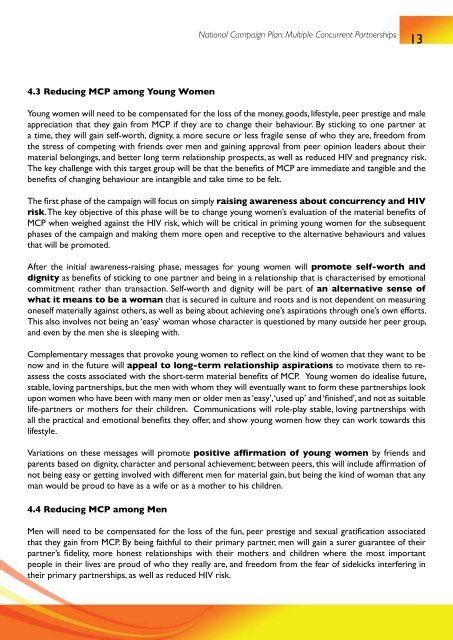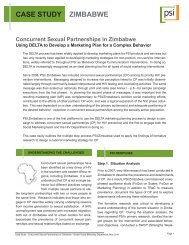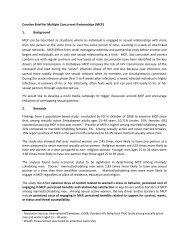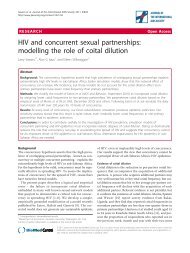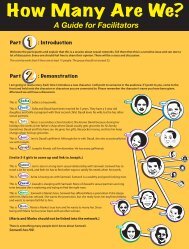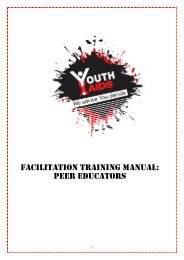O Icheke National Campaign Plan - CONCURRENT SEXUAL ...
O Icheke National Campaign Plan - CONCURRENT SEXUAL ...
O Icheke National Campaign Plan - CONCURRENT SEXUAL ...
- No tags were found...
You also want an ePaper? Increase the reach of your titles
YUMPU automatically turns print PDFs into web optimized ePapers that Google loves.
<strong>National</strong> <strong>Campaign</strong> <strong>Plan</strong>: Multiple Concurrent Partnerships134.3 Reducing MCP among Young WomenYoung women will need to be compensated for the loss of the money, goods, lifestyle, peer prestige and maleappreciation that they gain from MCP if they are to change their behaviour. By sticking to one partner ata time, they will gain self-worth, dignity, a more secure or less fragile sense of who they are, freedom fromthe stress of competing with friends over men and gaining approval from peer opinion leaders about theirmaterial belongings, and better long term relationship prospects, as well as reduced HIV and pregnancy risk.The key challenge with this target group will be that the benefits of MCP are immediate and tangible and thebenefits of changing behaviour are intangible and take time to be felt.The first phase of the campaign will focus on simply raising awareness about concurrency and HIVrisk. The key objective of this phase will be to change young women’s evaluation of the material benefits ofMCP when weighed against the HIV risk, which will be critical in priming young women for the subsequentphases of the campaign and making them more open and receptive to the alternative behaviours and valuesthat will be promoted.After the initial awareness-raising phase, messages for young women will promote self-worth anddignity as benefits of sticking to one partner and being in a relationship that is characterised by emotionalcommitment rather than transaction. Self-worth and dignity will be part of an alternative sense ofwhat it means to be a woman that is secured in culture and roots and is not dependent on measuringoneself materially against others, as well as being about achieving one’s aspirations through one’s own efforts.This also involves not being an ‘easy’ woman whose character is questioned by many outside her peer group,and even by the men she is sleeping with.Complementary messages that provoke young women to reflect on the kind of women that they want to benow and in the future will appeal to long-term relationship aspirations to motivate them to reassessthe costs associated with the short-term material benefits of MCP. Young women do idealise future,stable, loving partnerships, but the men with whom they will eventually want to form these partnerships lookupon women who have been with many men or older men as ‘easy’, ‘used up’ and ‘finished’, and not as suitablelife-partners or mothers for their children. Communications will role-play stable, loving partnerships withall the practical and emotional benefits they offer, and show young women how they can work towards thislifestyle.Variations on these messages will promote positive affirmation of young women by friends andparents based on dignity, character and personal achievement; between peers, this will include affirmation ofnot being easy or getting involved with different men for material gain, but being the kind of woman that anyman would be proud to have as a wife or as a mother to his children.4.4 Reducing MCP among MenMen will need to be compensated for the loss of the fun, peer prestige and sexual gratification associatedthat they gain from MCP. By being faithful to their primary partner, men will gain a surer guarantee of theirpartner’s fidelity, more honest relationships with their mothers and children where the most importantpeople in their lives are proud of who they really are, and freedom from the fear of sidekicks interfering intheir primary partnerships, as well as reduced HIV risk.


